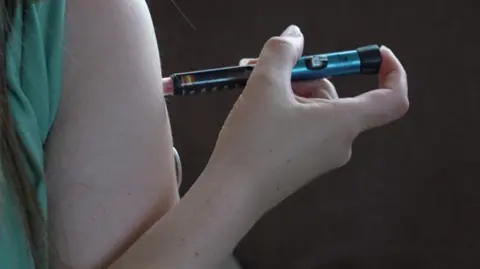Diabetes patient says she had to turn to social media for insulin

By Carwyn Jones, BBC News
 BBC
BBCA woman living with type 1 diabetes is calling for better communication on the supply of essential medication after she had to turn to social media for help in finding some.
Gwen Edwards, 27, from Anglesey, takes insulin and has been using Fiasp FlexTouch, a type of insulin that comes in a disposable pen.
A shortage notice about supplies of the insulin that she uses was sent to all surgeries and pharmacies in Wales in March, but Gwen said she was not made aware of this.
Her GP practice said it could not comment on individual cases, but the health board for north Wales said local pharmacies would not “routinely contact patients directly” about shortages of medicines because most would not see any disruption.
Gwen was diagnosed with type 1 diabetes when she was eight, and she has previously spoken about the obstacles she has faced living with the condition.
“I have to take insulin several times a day – morning, lunch, dinner,” she said.
“Every day is different, it all depends on what the blood levels are.”
According to her, she normally gets a prescription two weeks before her medicine runs out, but recently it became clear that there was a problem with the stock.

“I had to go and look for insulin. One chemist told me that they had run out and that there was no stock at all, so I was a bit worried,” she said.
Despite the low stock, she said she was not aware of the shortage.
“I went with the prescription to other places to look for the insulin. Five chemists later they told me that the insulin was out of stock.”
‘Running low since March’
She turned to social media to ask for help, receiving a number of messages.
“I was so grateful that I got insulin from a person I knew,” she said. “I got so many messages saying that other people still hadn’t been told that things were changing.”
She is now calling for more communication and awareness of how important insulin is for people living with diabetes.
“There has been a lack of information somewhere, because I have read more about it and there’s been an alert saying that the insulin is running low since March,” she said.
“The more I talk to people, some have heard and others haven’t heard that there is a shortage of the medicine.

Lowri Puw, a pharmacist and member of the Welsh Pharmacy Board, said a warning had been shared by the Welsh government that the shortage was expected to continue until 2025.
“The Fiasp PenFill, the cartridges that are placed in a reusable are still available, but very often there are problems in the process of producing the ingredients to put in the pen,” she said.
“There are a lot of different reasons and a lot of steps in the process of getting medicine to the pharmacy.”
On the other options available to diabetic patients, she said there were several things patients could do but they should have a chat with a pharmacist.
A spokesperson for Betsi Cadwaladr health board said: “Community pharmacies would not routinely contact patients directly around medicines shortages because the actions taken by healthcare professionals will mean the majority of patients do not experience any disruption to the supply of their medicines.”
The Welsh government said it would not routinely communicate such information directly to patients either, for the same reasons.
Although health is a devolved matter, the UK government is responsible for maintaining the supply of medicines.
A Department of Health and Social Care spokesperson said it was its priority to ensure patients continue to get the treatments they need.
“We work with the industry, the NHS, and others to help resolve supply issues as swiftly as possible and ensure patients continue to have access to an alternative treatment until their usual product is back in stock,” said the department.










